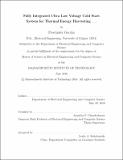Fully integrated ultra low voltage cold start system for thermal energy harvesting . . .
Author(s)
Garcha, Preetinder (Preetinder Kaur)
DownloadFull printable version (5.772Mb)
Other Contributors
Massachusetts Institute of Technology. Department of Electrical Engineering and Computer Science.
Advisor
Anantha P. Chandrakasan.
Terms of use
Metadata
Show full item recordAbstract
Wireless sensor networks used in various monitoring and sensing applications rely on energy harvesting for battery-less operation, as it minimizes the need for human intervention, and offers long term monitoring solutions. Typical energy harvesters use high efficiency boost converters, which are able to step-up voltages from as low as 10 mV. However, they often need > 200 mV in order to start up initially. Current solutions for achieving a low voltage start up require the use of bulky off-chip transformers, leading to undesired area overhead. This research work presents proof-of-concept for a fully integrated start-up system, which can cold-start from < 50 mV using on-chip magnetics, and also be used as an energy harvesting charger for ultra low power applications. The use of lossy on-chip transformers in a Meissner Oscillator compared to high-quality off-chip transformers pose new design and optimization challenges. Hence, we have derived intuitive analytical expressions that are well-suited for use with the on-chip magnetics, and used them to co-optimize the oscillator components. An optimized depletion mode MOS transistor was fabricated and tested with an off-chip transformer, to exhibit oscillations from <3 mV DC input voltage. An optimized on-chip transformer, 36x smaller in area than the off-chip transformers, is currently awaiting layout and fabrication. A switched capacitor DC-DC circuit has also been designed, which can rectify and boost up the oscillator's output voltage to 1.2 V, to have a complete start-up system for energy harvesting.
Description
Thesis: S.M., Massachusetts Institute of Technology, Department of Electrical Engineering and Computer Science, 2016. This electronic version was submitted by the student author. The certified thesis is available in the Institute Archives and Special Collections. Cataloged from student-submitted PDF version of thesis. Includes bibliographical references (pages 93-96).
Date issued
2016Department
Massachusetts Institute of Technology. Department of Electrical Engineering and Computer SciencePublisher
Massachusetts Institute of Technology
Keywords
Electrical Engineering and Computer Science.